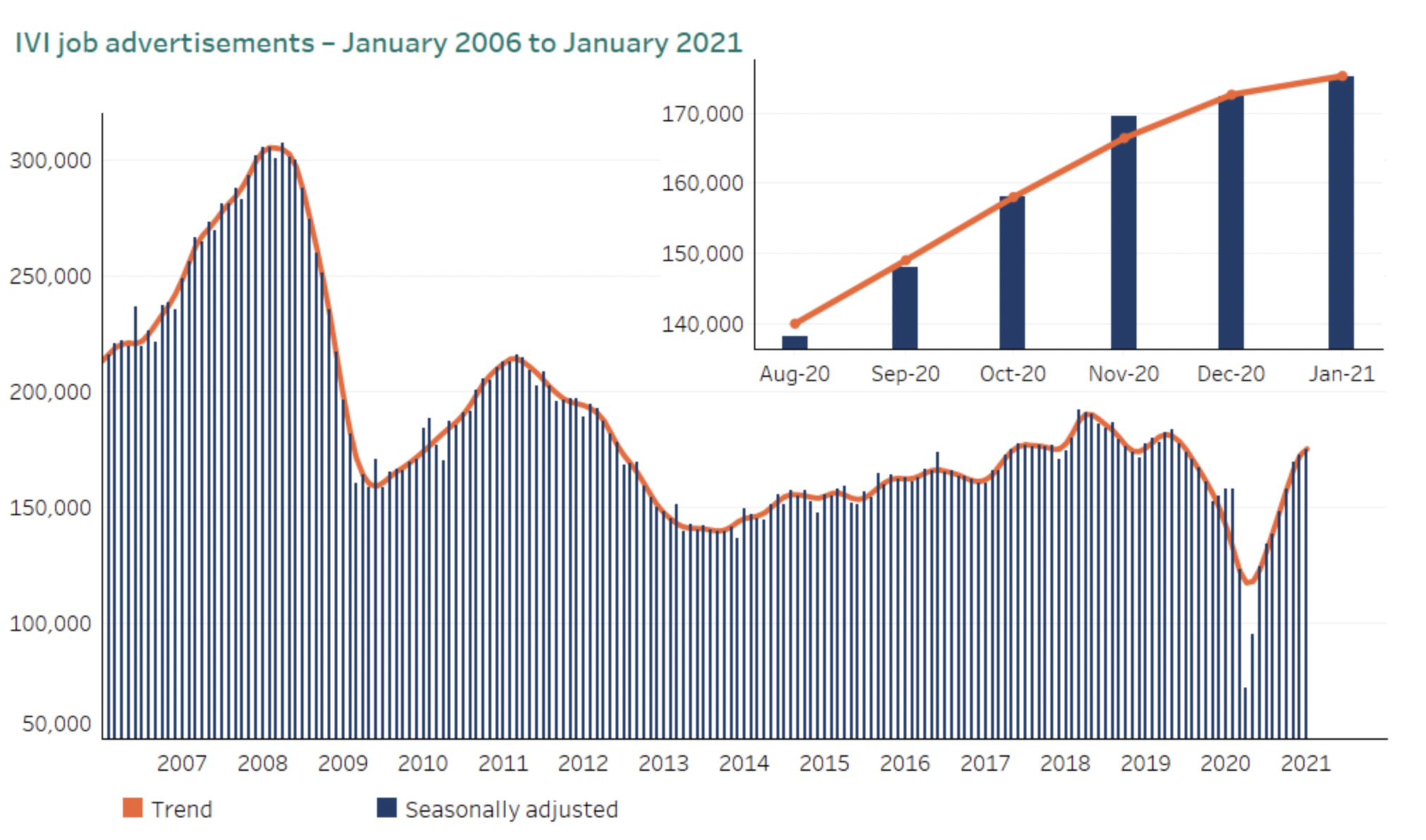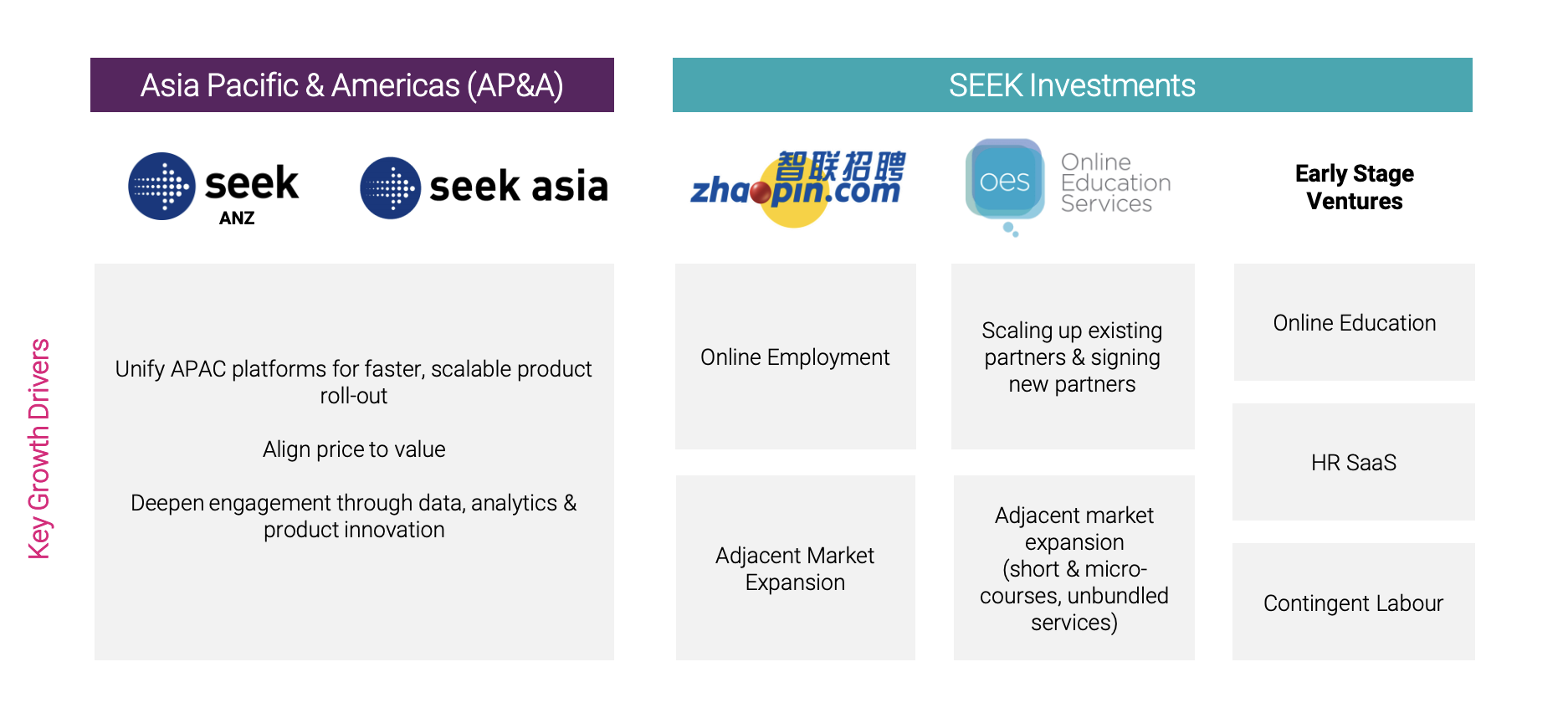Surprise Seek split looks to win over investors

Livewire Markets
Seek surprised the market in more ways than one in its half-yearly report today. There was positive guidance on full-year revenue to $1.7 billion from $1.6 billion and an EBITDA upswing from $404 million to $460 million. Seek also reported it will repay $9.8 million in COVID-related subsidies, including JobKeeper.
But the real news was of a different order: Seek's "Asia Pacific and Americas (AP&A)" business will be headed up by ex-CommBank CEO Ian Narev, who is stepping up from COO to CEO, and its "Investments" arm, will be headed up by co-founder Andrew Bassat from 1 July 2021. How did the market react? If you cup an ear you just might hear the sound of chips being cashed, as the share price slid near 8% throughout the day.
But to find out what it really means, well - that's a different question. So we brought in the experts: Stuart Jackson, portfolio manager for Montgomery Investment Management, and Jun Bei Liu, portfolio manager for Tribeca Investment Partners.
By the numbers …
- Seek surpassed market expectations when it upgraded its guidance on full-year revenue to $1.7 billion, up from $1.6 billion, and its EBITDA from $404 million to $460 million.
- Despite this, the Seek share price (ASX:SEK) moved from a low of $11.95 per share in March last year, to a high of $30.70 earlier this month. Previous close (22 Feb) was $30.34, while today, shares slid nearly 8% to $27.84 per share (at 3pm).
- Seek's valuation of its Chinese jobs portal Zhaopin was disappointing. At $2.2 billion, market analysts felt this was an undervaluation of the company and its yield potential from the Chinese market.
- Seek reported it will repay $9.8 million in COVID-related subsidies, including JobKeeper.
"I think the market was really expecting an upgrade because we've seen a fairly significant turnaround in job adverts as publishing monthly data by both ANZ and Seek itself," said Stuart Jackson, portfolio manager for Montgomery Investments.
Overall, Seek has had an unexpectedly positive year through COVID-19 and this showed up in the half-yearly report with a significant upgrade to its earnings. Its domestic business recovery was strong, with job advertisement data produced by the Australian Government showing a sharp uptick through H2 2020 and into 2021.

Image: Job Advertisements Recovery - Internet Vacancy Index (IVI). Source: Australian Government Labour Information Portal.
Strong fundamentals
The underlying premise of Seek as a business is sound. At its core, it simply connects employers with a pool of candidates and allows them to streamline their hiring, and it has a huge market share.
"I actually have followed Seek, perhaps from the very beginning, we were shareholders of Seek during the GFC. So we've been seeing them through the early cycles, then seeing them dominate the market and grow with it," said Jun Bei Liu, portfolio manager for Tribeca Investment Partners.
Seek continues to outperform expectations by generating better intelligence about its users and applying it back into the product.
"It's been investing heavily to utilise the data that actually generates and captures in its portal to better facilitate jobseekers and employers in more efficient way. It has a very strong platform, which is built to scale that investment over a number of years to facilitate that and reduce labour friction," said Jackson.
"From our perspective, it is a high-quality business with a fairly long growth profile, ahead of it as to try and capture that opportunity in disrupting what is a traditional and fairly labour intensive form of matching jobseekers and hirers," said Jackson.
Pricing restructure an investor's dream
One of the highlights of the past year, however, has been a shift in the pricing structure for Seek, domestically, which has increased yields across the business and insulating it from loss of volumes.
"What's been really incredible was how they managed to start growing by changing the pricing structure. They actually demonstrated they could increase the yields as well where previously we always believed Seek was more of a volume game," said Liu.
Seek has re-structured pricing around market segmentation. The structure follows that if the job is more difficult to recruit for, or a more specialised skill set, it will be more expensive to place.
"If it's a really simple, commoditised, unskilled position - it's a cheap ad. But if it's a really technical, hard-to-find individual, or very small base of potential candidates, they charge a lot more for it because they're adding more value," said Jackson.
It does however have two potential drawbacks, down the track. With participation rates at a low and underemployment at a high, there could be more jobs that fall into what Jackson calls a "commoditised" job category, so Seek could be losing out on volumes at the cheaper end of the scale. That is, the total job pool could be more heavily weighted towards cheap ads.
Two businesses are better than one
Moving forward Seek will be split into its "Asia Pacific and Americas (AP&A)" business, headed up by Narev, and its "Investments" arm, headed up by Bassat. In its report, Seek wrote these two arms of the business will "benefit from a greater degree of independence". This, in turn, will create greater transparency for investors and more confidence in the business, said Liu,
"From Seek's perspective, I don't see much of a reason to hold them together," said Jackson.
"I think one of the frustrations I've had for a long time is some of the loss-making businesses that they've got in the portfolio - the market doesn't really value them at all," he said.
"Management may think that you keep them separate, you might get a better valuation, or a more representative value on those businesses in isolation," he said.

Zhaopin disappoints (but there's hope for the future)
Seek's performance over the last six months has been somewhat tainted by a report from short-sellers Blue Orca who hunted down and speared Seek's subsidiary, Zhaopin Services, the Chinese arm of their jobs portal. After a brief trading halt, and share prices rebounded dismissing the criticisms as unwarranted.
However, perhaps some of the ill-effects from Blue Orca's report have lingered, as the valuation of the Zhaopin business at $2.2 billion was hugely underwhelming to investors. Both Jun Bei Liu and Stuart Jackson described the valuation as "disappointing".
While neither opposed the sell-down, which has been discussed in the market for some time, both felt with the yield opportunities and upside potential of a burgeoning Chinese market, Zhaopin could fare better.
It's worth noting the sell-down has only been flagged and the investment value is not locked in. Liu said, while speculators have wide-ranging valuations, some sell-side analysts have put Zhaopin's value at somewhere between $2.3 - $4.0 billion. But it's not all bad news, the cash injection from the sell-down could benefit investors down the track.
"In my view is that if you can recycle that capital into something with more return then I think it's a really good thing," said Liu.
Conclusion
A new structure and leadership for this division of the business are perhaps the boost shareholders are looking for - a dedicated eye on the growth opportunities moving forward with a known entity at the helm.
Never miss an insight
Enjoy this wire? Hit the ‘like’ button to let us know. Stay up to date with my content by hitting the ‘follow’ button below and you’ll be notified every time I post a wire. Not already a Livewire member? Sign up today to get free access to investment ideas and strategies from Australia’s leading investors.
1 stock mentioned
2 contributors mentioned

Mia Kwok is a former content editor at Livewire Markets. Mia has extensive experience in media and communications for business, financial services and policy. Mia has written for and edited several business and finance publications, such as...
Expertise

Mia Kwok is a former content editor at Livewire Markets. Mia has extensive experience in media and communications for business, financial services and policy. Mia has written for and edited several business and finance publications, such as...
